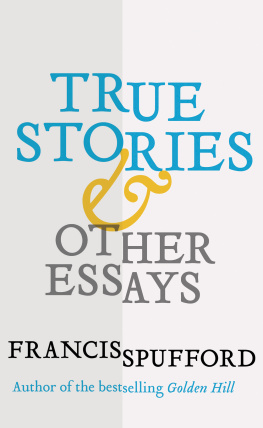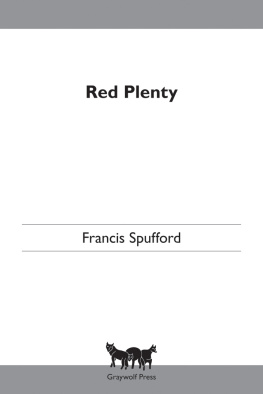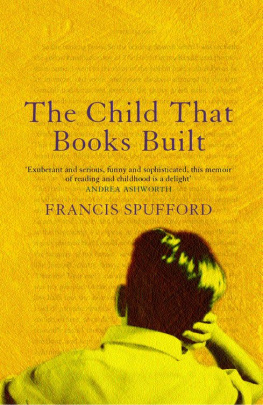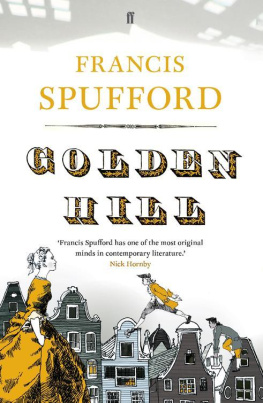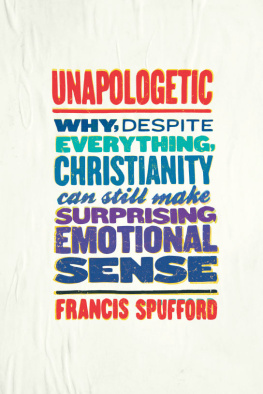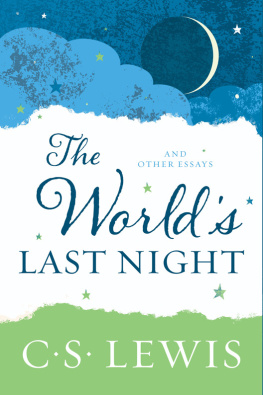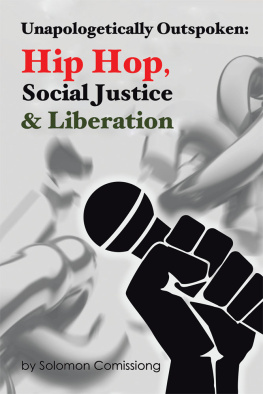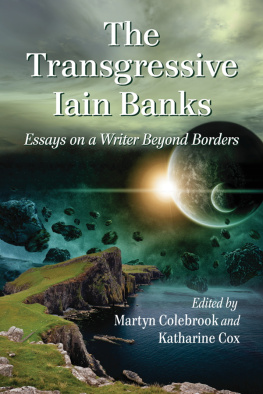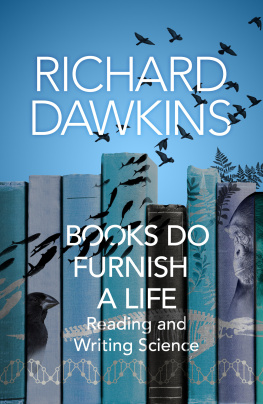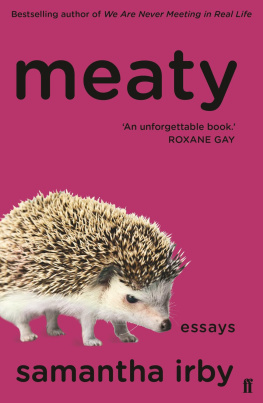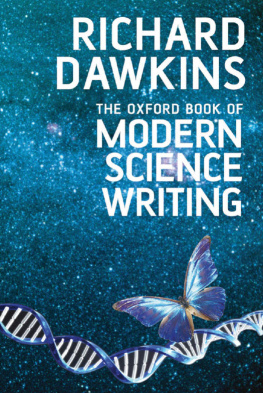TRUE STORIES & OTHER ESSAYS

Copyright 2017 Francis Spufford
All rights reserved. This book may not be reproduced in whole or in part, in any form (beyond that copying permitted by Sections 107 and 108 of the U.S. Copyright Law and except by reviewers for the public press) without written permission from the publishers.
For information about this and other Yale University Press publications, please contact:
US Office:
Europe Office:
Set in Minion Pro by IDSUK (DataConnection) Ltd
Printed in Great Britain by Gomer Press Ltd, Llandysul, Ceredigion, Wales
Library of Congress Cataloging-in-Publication Data
Names: Spufford, Francis, 1964 author.
Title: True stories : and other essays / Francis Spufford.
Description: New Haven, CT : Yale University Press, 2017. | Includes bibliographical references and index.
Identifiers: LCCN 2017021076 | ISBN 9780300230055 (hardback)
Subjects: | BISAC: LITERARY COLLECTIONS / Essays.
Classification: LCC PR6119.P84 A6 2017 | DDC 814/.6dc23
LC record available at https://lccn.loc.gov/2017021076
A catalogue record for this book is available from the British Library.
10 9 8 7 6 5 4 3 2 1
CONTENTS
INTRODUCTION: TRUE STORIES
The imagination, said Coleridge, is the power to disimprison the soul of fact.
Except he didnt. Say it, that is. I read this sentence a few years ago, and took to it immediately. It sounds so right, with that awkward word-coinage disimprison in it surely just the kind of thing the poet would pull out of the air as he scratched along in a notebook at the speed of thought. And its such a tempting idea, especially if you yourself work by choice in the kinds of writing that cross backwards and forwards between whats factual and whats not.
Fact with something inside it that will stay factual, when you let it out; fact that wants to be let out, from its prison of literal dates and documents, to roam free and have non-literal adventures. As Tolkien said, who doesnt approve of escape? Jailers, thats who. If fact did have a soul an essence, an inward spirit of faithful correspondence to reality and this wisp of truthfulness could exist independently of particular data to be true to, you could export the ethics of fact into quite other projects. You could let imagination noodle out into wild paisley filigree, and still dot each nested curl of fancy with rigour, with puritan conviction. Conversely, you could award yourself fictions freedom to invent in situations where, strictly speaking, it would only be possible to select from the menu of the real. You could be essentially true to the facts, rather than literally so.
It would be a manifesto for a non-literal fidelity to the world.
I thought Id just pin down an exact source before I made it my manifesto. Not in the Biographia Literaria, the home for Coleridges most organised thoughts about imagination. Not in the many ragbag volumes of his Notebooks either. Not anywhere in his collected works, or in any other single persons collected works, in fact. For the real (and rather boring) history of the sentence turned out to be an object-lesson in the flinty resistance of actuality to being organised into nice narrative.
Wordsworth (not Coleridge) referred to belief (not imagination) being the soul of fact in a dull poem of 1837 about looking at Italian churches. Thomas Carlyle, grumping about the extension of the British franchise to working men in 1867 in Shooting Niagara, said that real Art is definable as ... the disimprisoned Soul of Fact. In other words, proper art lets back the fervour that nasty democracy locks out. Then, in 1949, the critic Basil Willey published an essay on Coleridge in which he quoted Carlyle from memory, unattributed, without internal quote marks, and in a context open to misremembering. Someone did misremember, and a chimaera of a thought was born, with three separate authors none of whom intended it to make the point it now seems to, and a fourth authors name on it. Mislabelled, anonymised, pseudonymised, its not an elegant poets paradox. Its an accidental assertion, clotted into existence from historical white noise.
And yet the thing it claims by accident must be true. Mustnt it?
There is a fidelity to the real that can be manifested in non-literal as well as literal ways, and it must be active in fictions, to prevent soul-loss, to keep us able to tell the difference between stories and lies. However complicated and necessary the lines may be between different kinds of representation, we still know instinctively that Plato is wrong to ban the poets from the just city, as if all the truth we need we could get without imagination.
We see immediately even if it pitches us straight into the paisley filigree to try to reason it out, afterwards that there is more truth to be got to than we could reach just from the data. There is more of what binds us to the world of everything that is the case than you can arrive at through the metaphor-free glacier water of early Wittgenstein. Some truth inheres, and only inheres, in impure, compromised, unreliable, representative speech. It cant be distilled out. (Thats why late Wittgenstein became an explorer of language.)
Even if facts have no souls, or souls themselves are only a metaphor, we still need the jailbreak that lets us revolve the facts in story; or lets us tamper with them, fix one fact as the variable of interest and alter all those surrounding it. Maybe that shouldnt be jailbreak in the singular but the plural. Multiple necessary liberations. I look at the contested line between the factual and the fictional, and I dont see smooth blending, a zone of blur where the qualities of each dilute into the other. I see mosaic, a particulate inheritance from fiction and non-fiction where any smooth combining of the two is an effect of distance or of successful trickery; where, at tiny scale, the necessary tensions and differences between whats selected and whats invented reproduce themselves in individual elements of the writing.
A non-fiction writer must have the freedom to imagine the facts they use, so that they stand partly in the relationship as creator even to materials that are fully attested and verified. A writer of fiction must have the freedom to treat (and the burden of treating) the things they make up as if they were facts, so that they may disclose what facts never have done, never having existed in that particular configuration or been seen from that particular angle. And a writer who happens also to be a believer my own particular complication must have the freedom to remember that the story they believe is truest is, as well as being true, a story. To be a Christian is to hold (among other important things) that the unverifiable Word preceding all individual words, the creation underlying all specific creations, the vast polyvalent Yes on which we try to orient ourselves, makes one of its nearest approaches to us, narrative creatures that we are, through story, where the absolutes we cannot possibly comprehend gleam momentarily into sight on the moving surfaces of represented people and events. Gospel truth is story truth.
The non-fiction writer needs to imagine their facts because that is part of selecting them. Theres reality, happily existing without your intervention: the manifold of innumerable objects, systems, histories, persons, languages, interpretations, ideologies, disciplines; knowledge of which is divided often inaccessibly between different knowers, partly available to you on easy terms, partly almost impossible to understand on any terms. But you cant just contemplate the real. A separate act is required to pick out from it: an act that turns a given thing into a chosen one. You have to imagine the real, just as you have to accept the inevitable, if you want to
Next page
